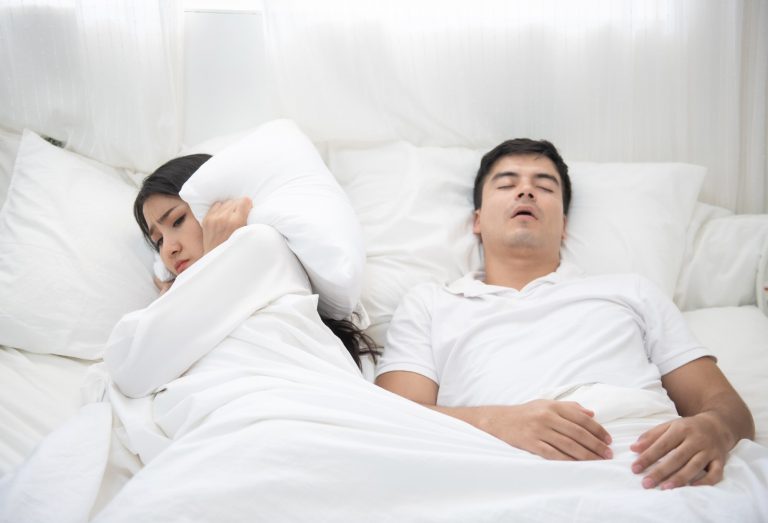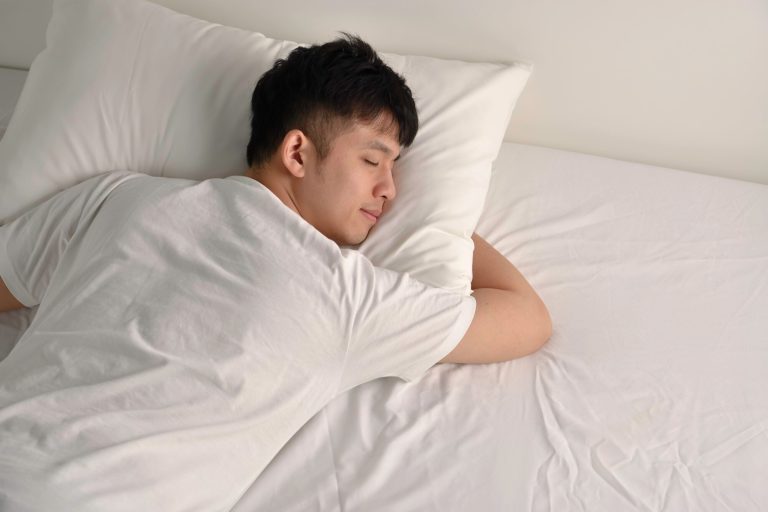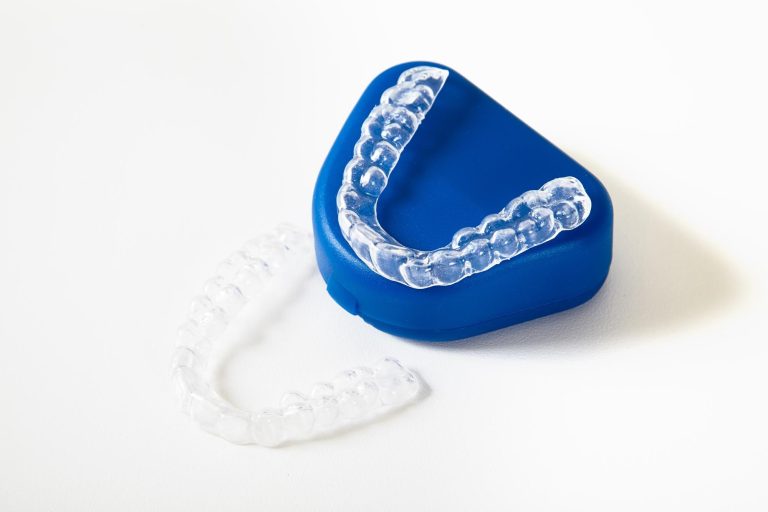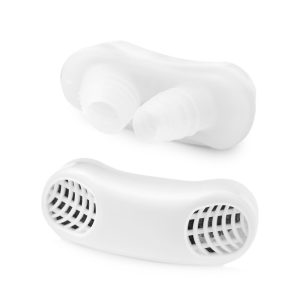
Snoring occurs when the airflow through your throat becomes partially blocked during sleep, causing the soft tissues in your mouth, nose, and throat to vibrate, which produces the familiar sound we all recognize.
We often laugh about it until it starts interfering with our sleep, affecting our health, or disturbing our partner’s peace of mind.
Snoring is surprisingly common; about 45% of adults snore occasionally, and 25% snore habitually. While it’s often considered a minor inconvenience, it shouldn’t be dismissed lightly. Persistent snoring may indicate an underlying medical condition that requires professional attention.
Let’s look at what causes snoring, when to be concerned, and 10 remedies to help you or your partner sleep better.
Several factors can cause snoring, including a combination of factors.
Some common causes include:
Identifying the source of your snoring is the first step before finding the right fix
Snoring may be more than a nuisance. Although it is relatively normal to snore occasionally, frequent and loud snoring, accompanied by other symptoms, may be a sign of Obstructive Sleep Apnea (OSA). This disorder involves abruptly stopping and resuming breathing many times a night.
These are the red flags to watch out for:
If these signs sound familiar, it might be time to get checked. Learn how dentists can help treat sleep apnea with non-invasive, effective solutions designed to improve your breathing and sleep quality.

Snoring does not always need surgery or medication. Try these 10 simple and effective remedies, some as early as tonight.
Sleeping on your back may cause the tongue and soft palate to move into your throat, partially blocking your airway, making snoring more pronounced. To maintain the natural posture, a favourable body pillow should help you remain in a proper position at night to aid comfortable side sleeping.
You can improve the airflow by lifting your head 10-15 cm, which will either open the airway more or restrict the chances of parts of the throat closing. Such a posture can be supported comfortably by using an anti-snore pillow.
Reduce alcohol use, particularly three hours before you sleep, as it will prevent your throat muscles from over-relaxing
Smoking causes inflammation and swelling of the airways, thus increasing the likelihood of snoring. By giving up or reducing the amount of smoke, you can notice improvement in your breathing and sleep.
Over-the-counter nasal strips or internal nasal dilators are devices that physically open the nasal passages, allowing you to breathe more easily. They’re especially effective if nasal congestion is the main cause of your snoring.
The mucus in your throat and nose becomes dry if you are not adequately hydrated, which can exacerbate snoring. Drink at least 6 to 8 glasses of water daily, especially during dry spells or cooler nights
Going to bed and getting up at the same time every day helps your body to go into deeper, more relaxing sleep stages, decreasing odd breathing patterns which lead to snoring.
Dry air may also cause snoring due to increased irritation of the nose and throat tissues. Add a cool-mist humidifier or temporarily lower the temperature on your air conditioner to increase the moisture in the air in dry weather or cool nights.
Oral appliances are especially functional in structural issues like a misaligned jaw; these appliances help move the jaw forward to ensure an open airway when sleeping.
It’s a good idea to consult a dental professional specialising in sleep dentistry for the best results. They can create a custom-made device that fits your jaw perfectly, providing comfort and effective relief from snoring.
The oropharyngeal exercises are simple movements to tone your throat muscles and tongue. These stronger muscles will lower the risk of collapsing and suffocating you during your somnolence period.
Here are some of the exercises you can try:
When practised regularly, these exercises will bring a visible difference within a longer period. As with any exercise regimen, consistency is key, so keep at it, and you will enjoy long-term, better sleep.

Your throat muscles and tongue tend to relax during sleep, collapsing into your airway and causing snoring. Your jaw position is also vital because when the lower jaw is set too far back, it causes the tongue to be pushed into the airway, thus resulting in the vibrations.
MADs or mandibular advancement devices are a gentle alternative to CPAP therapy. These custom-made oral devices work by positioning your lower jaw slightly forward during sleep, pulling your tongue away from the throat, and naturally clearing the airway.
Key Benefits:
Dentists in sleep medicine understand oral anatomy and how jaw positioning affects airflow. They can create perfectly fitted devices and provide ongoing care to ensure effectiveness while protecting oral health.
Oral appliances are a rapidly growing first-line treatment of snoring, with the advantages of comfort and ease of use over the complexity of conventional sleep treatment devices.

The journey to quieter, more restful sleep doesn’t have to be difficult. Start with simple lifestyle changes, such as adjusting your sleeping position, maintaining a healthy weight, or avoid alcohol before bed. These small steps often lead to big improvements.
If snoring persists or worsens, especially if it comes with gasping or daytime fatigue, it’s time to take it seriously. Identifying the cause is key to ruling out conditions like sleep apnea and finding the right solution.
The good news? Snoring is treatable. Custom oral devices, modern treatments, and small adjustments can make a big difference. At Hello Dental, we offer practical, dentist-guided solutions designed to help you sleep better and feel your best every day.
Copyright © 2024 Hello Dental Clinic. All Right Reserved.
475, Jalan Sultan Azlan Shah,
Taman Million,
51200 Kuala Lumpur
Mon-Fri: 09:00-19:00
Sat-Sun: 09:00-17:00
V06-02-05, Signature Retail Lot,
Sunway Velocity,
Lingkaran SV, Jalan Shelley,
55100 Cheras KL
Mon-Fri: 09:30-21:00
Sat-Sun: 09:00-18:00
2-02, Level 2, Wisma Conlay,
No.1, Jalan USJ 10/1,
Taipan Business Centre,
47620 Subang Jaya, Selangor
Mon, Tue, Fri: 10:00-18:30
Wed, Thu: 10:00-21:00
Sat, Sun: 09:00-15:30
G-8, Idaman Robertson,
No. 2, Jalan Robertson,
50150, Kuala Lumpur.
Mon, Thur: 11:00-20:00
Tue, Wed, Fri: 09:30-21:00
Sat, Sun: 10:00-19:00
No. 2-2 (Second Floor),
Jalan Solaris 5,
Solaris Mont Kiara,
50480 Kuala Lumpur
Mon-Fri: 10:00-19:00
Sat-Sun: 10:00-18:00